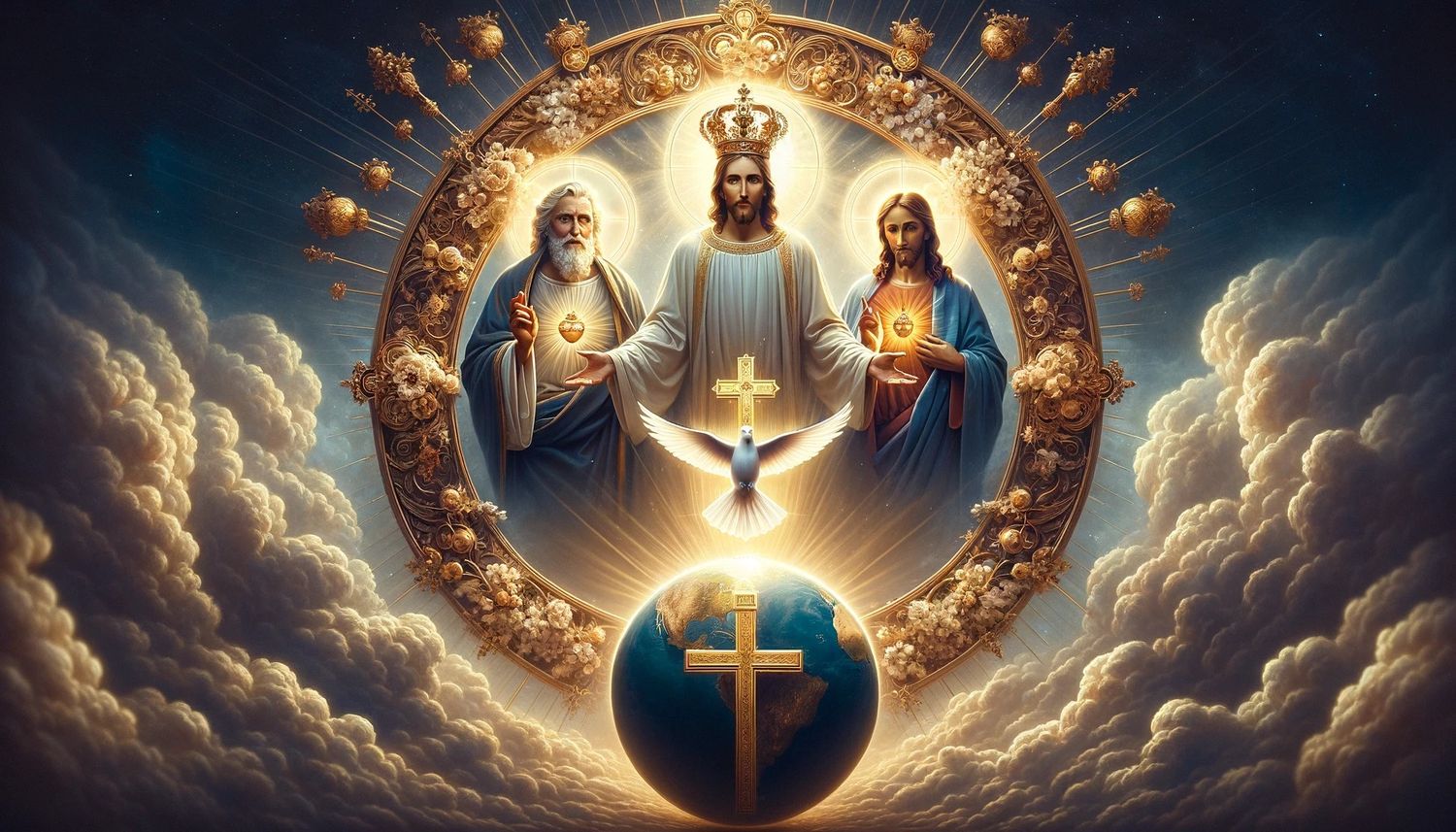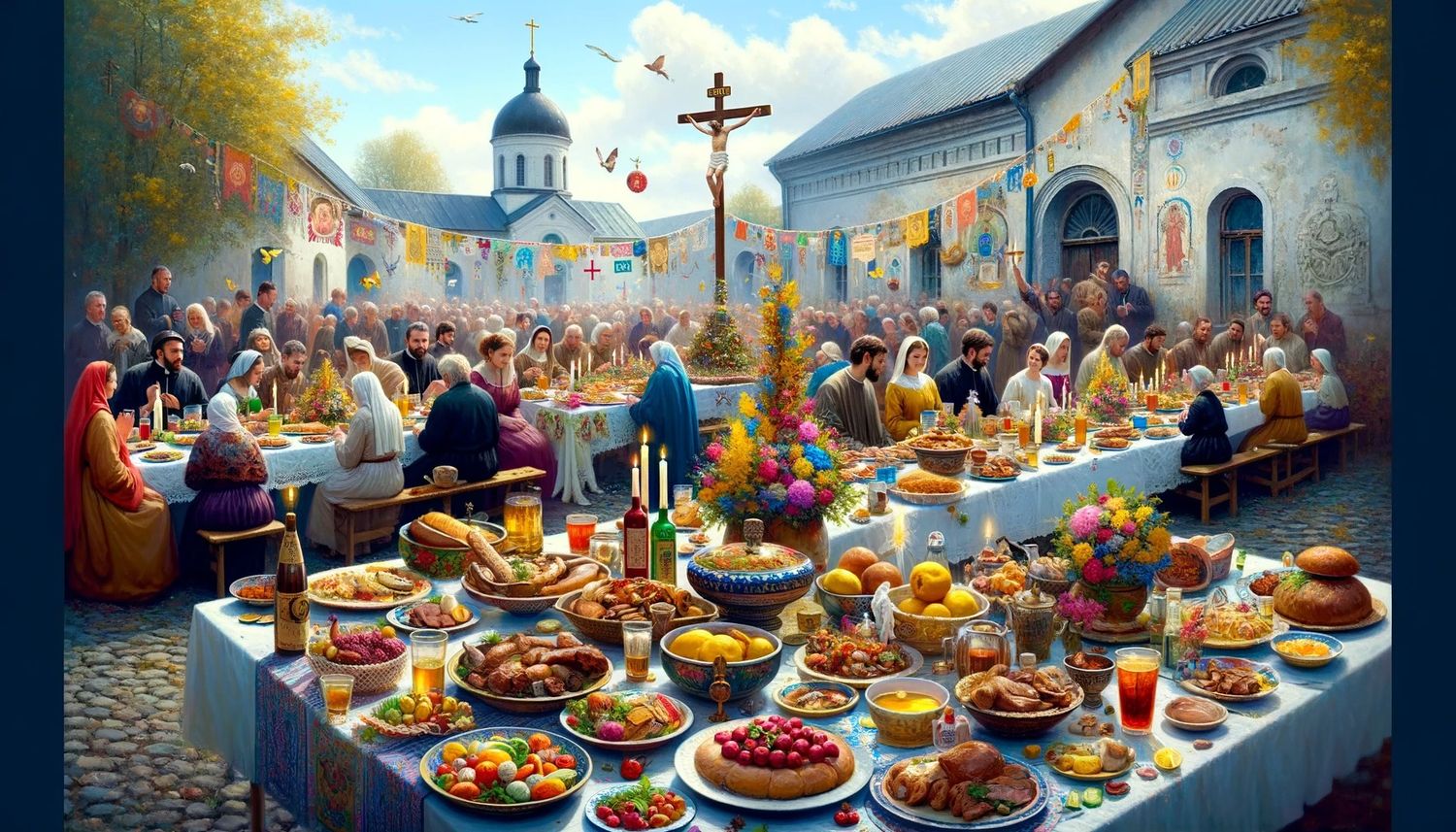Home>Theology and Spirituality>What Is Confirmation In Catholicism


Theology and Spirituality
What Is Confirmation In Catholicism
Published: February 17, 2024
Jason DeRose, Managing Editor at Christian.net, uses his expertise in religion and journalism to deepen understanding of faith's societal impacts. His editorial leadership, coupled with a strong academic background, enriches the platform’s diverse content, earning him recognition in both journalism and religious circles.
Learn about the significance of confirmation in Catholicism and its role in theology and spirituality. Explore the sacrament's meaning and importance.
(Many of the links in this article redirect to a specific reviewed product. Your purchase of these products through affiliate links helps to generate commission for Christian.net, at no extra cost. Learn more)
Table of Contents
Introduction
Confirmation is a significant sacrament in the Catholic Church, marking a pivotal moment in the spiritual journey of a believer. Rooted in rich tradition and profound symbolism, this sacrament holds deep meaning for Catholics around the world. It serves as a rite of passage, signifying a mature commitment to the faith and a deepening of the bond with the Church.
The sacrament of Confirmation is a sacred and joyous occasion, often celebrated with great reverence and festivity within the Catholic community. It represents a profound spiritual awakening and a conscious decision to embrace the teachings and values of the Church. As individuals prepare to receive this sacrament, they embark on a transformative journey of self-discovery and spiritual growth, guided by the wisdom and grace of the Holy Spirit.
Confirmation is not merely a ritualistic tradition; it is a sacred covenant between the individual, the Church, and God. Through this sacrament, Catholics affirm their faith and embrace their role as active members of the Church, empowered by the gifts of the Holy Spirit. It is a time of reflection, prayer, and discernment, as candidates for Confirmation seek to deepen their understanding of the faith and their personal relationship with God.
The significance of Confirmation extends beyond the individual experience, resonating deeply within the fabric of the Catholic community. It is a testament to the enduring legacy of faith, passed down through generations, and a celebration of the unity and strength found in the communion of believers. As candidates prepare to receive the sacrament of Confirmation, they are enveloped in a sense of belonging and solidarity, knowing that they are part of a timeless tradition that spans continents and cultures.
In the following sections, we will delve into the history, significance, and transformative power of Confirmation in Catholicism, exploring its profound impact on the lives of believers and the spiritual tapestry of the Church. Through this exploration, we will gain a deeper understanding of the sacred journey of Confirmation and the enduring relevance it holds in the hearts of Catholics worldwide.
Read more: What Comes First: Communion Or Confirmation
The Sacrament of Confirmation
The Sacrament of Confirmation, also known as Chrismation in the Eastern Catholic Churches, is one of the seven sacraments of the Catholic Church. It is a profound and sacred ritual through which baptized individuals are enriched with the special strength of the Holy Spirit. This sacrament is deeply rooted in the teachings and traditions of the Church, dating back to the early days of Christianity.
Confirmation is often referred to as the "sacrament of Christian maturity," signifying a pivotal moment in the spiritual journey of a believer. It is a time when individuals reaffirm their faith and commitment to the teachings of the Church, embracing their role as active members of the Christian community. Through the anointing with chrism oil and the laying on of hands by a bishop, candidates for Confirmation receive the gifts of the Holy Spirit, empowering them to lead lives of faith, virtue, and service.
The sacrament of Confirmation is closely linked to the sacrament of Baptism, forming a vital part of the journey of initiation into the Catholic faith. While Baptism lays the foundation for a life of discipleship, Confirmation serves as a moment of empowerment and deepening of the spiritual bond with the Church. It is a time when individuals take ownership of their faith, embracing the responsibilities and blessings that come with being fully initiated members of the Church.
In the sacrament of Confirmation, candidates receive the seven gifts of the Holy Spirit: wisdom, understanding, counsel, fortitude, knowledge, piety, and fear of the Lord. These gifts equip individuals with the spiritual tools necessary to navigate the complexities of life with grace, wisdom, and discernment. Moreover, Confirmation strengthens the bond between the individual and the Church, fostering a sense of belonging and unity within the broader Christian community.
The significance of Confirmation extends beyond the individual experience, resonating deeply within the fabric of the Catholic community. It is a testament to the enduring legacy of faith, passed down through generations, and a celebration of the unity and strength found in the communion of believers. As candidates prepare to receive the sacrament of Confirmation, they are enveloped in a sense of belonging and solidarity, knowing that they are part of a timeless tradition that spans continents and cultures.
Confirmation is a sacred and joyous occasion, marking a profound milestone in the spiritual journey of a Catholic believer. It is a time of celebration, reflection, and renewal, as individuals embrace the fullness of their faith and the transformative power of the Holy Spirit. Through the sacrament of Confirmation, the Church continues to nurture and guide its members, empowering them to live out their faith with courage, compassion, and unwavering devotion.
The History of Confirmation in Catholicism
The history of Confirmation in Catholicism is deeply intertwined with the early traditions and practices of the Christian Church. Its origins can be traced back to the apostolic era, where the sacrament played a pivotal role in the process of initiation into the Christian faith. In the early centuries of Christianity, Confirmation was closely linked to the sacrament of Baptism, forming a seamless journey of spiritual rebirth and empowerment for believers.
During the early Church, Confirmation was administered immediately after Baptism, often by the laying on of hands and anointing with chrism oil by the bishop. This practice symbolized the reception of the Holy Spirit and the conferral of spiritual gifts upon the newly baptized individuals. The sacrament served as a means of strengthening and empowering the faithful to live out their Christian calling with courage and conviction.
As the Church evolved and expanded, the practice of Confirmation underwent various developments, adapting to the cultural and ecclesiastical contexts of different regions. In the Latin Church, Confirmation became more distinct from Baptism, emphasizing its role as a sacrament of initiation and a public affirmation of faith. The anointing with chrism oil and the invocation of the Holy Spirit became central elements of the Confirmation ritual, signifying the indelible seal of the Spirit upon the candidates.
Throughout the centuries, the Church Fathers and theologians contributed to the theological understanding of Confirmation, emphasizing its role in strengthening the bond with the Church and equipping believers with the gifts of the Holy Spirit. The Council of Trent in the 16th century reaffirmed the sacramental nature of Confirmation, solidifying its place as one of the seven sacraments of the Catholic Church.
In the modern era, the Second Vatican Council brought about significant reforms in the liturgical celebration of Confirmation, emphasizing its connection to the Eucharist and the role of the laity in the life of the Church. These reforms sought to deepen the understanding of Confirmation as a sacrament of Christian maturity, empowering individuals to bear witness to their faith in the world.
Today, the history of Confirmation in Catholicism stands as a testament to the enduring legacy of faith and the rich tapestry of tradition that continues to shape the spiritual journey of believers. It remains a sacred and transformative sacrament, carrying forward the timeless significance of initiation and empowerment within the Catholic Church.
The Role of Confirmation in the Catholic Church
Confirmation holds a pivotal role in the life of the Catholic Church, serving as a sacrament of initiation that marks a significant milestone in the spiritual journey of believers. This sacred rite plays a multifaceted role in the life of the Church, encompassing elements of empowerment, commitment, and unity within the Christian community.
At its core, Confirmation is a sacrament of empowerment, bestowing upon the candidates the gifts of the Holy Spirit. These gifts, including wisdom, understanding, fortitude, and piety, equip individuals with the spiritual tools necessary to navigate the complexities of life with grace and discernment. Through Confirmation, individuals are strengthened and emboldened by the presence of the Holy Spirit, empowering them to live out their faith with courage and conviction.
Furthermore, Confirmation signifies a conscious commitment to the teachings and values of the Catholic Church. It represents a mature affirmation of faith, as candidates willingly embrace their role as active members of the Christian community. This commitment extends beyond personal devotion, fostering a sense of responsibility and stewardship within the broader Church. Through Confirmation, individuals pledge to uphold the principles of love, compassion, and justice, actively contributing to the mission of the Church in the world.
Moreover, Confirmation plays a vital role in fostering unity and solidarity within the Catholic community. As individuals receive the sacrament, they become fully initiated members of the Church, strengthening the bonds of fellowship and communion among believers. This sense of unity extends beyond geographical boundaries and cultural differences, uniting Catholics around the world in a shared journey of faith and service.
Additionally, Confirmation serves as a catalyst for spiritual growth and discipleship within the Church. It marks a transition from childhood faith to a more mature and intentional expression of belief. Through this sacrament, individuals are called to deepen their relationship with God, engage in ongoing spiritual formation, and actively participate in the life of the Church. Confirmation ignites a sense of purpose and mission, empowering individuals to bear witness to their faith in the world and contribute to the ongoing work of God's kingdom.
In essence, the role of Confirmation in the Catholic Church is multifaceted and profound, encompassing elements of empowerment, commitment, unity, and discipleship. It stands as a testament to the enduring vitality of the Church and the transformative power of the Holy Spirit in the lives of believers. Through this sacrament, the Church continues to nurture and guide its members, empowering them to live out their faith with courage, compassion, and unwavering devotion.
The Process of Confirmation
The process of Confirmation in the Catholic Church is a sacred and transformative journey that encompasses spiritual preparation, ritualistic elements, and profound significance for the candidates. From the initial stages of discernment to the culminating celebration of the sacrament, the process of Confirmation unfolds as a deeply meaningful and formative experience for individuals seeking to embrace their faith with greater depth and commitment.
The journey typically begins with a period of intentional preparation, during which candidates engage in religious education, spiritual formation, and discernment of their readiness to receive the sacrament. This preparatory phase often involves participation in Confirmation classes, where candidates delve into the teachings of the Church, explore the significance of Confirmation, and reflect on the implications of embracing a mature commitment to their faith.
As the candidates progress through the preparation process, they are encouraged to deepen their prayer life, engage in acts of service and charity, and cultivate a personal relationship with God. This period of spiritual formation is essential for nurturing a genuine and heartfelt readiness to receive the sacrament, as individuals seek to align their lives more closely with the teachings of Jesus Christ and the values of the Gospel.
The actual ritual of Confirmation typically takes place within the context of a special liturgical celebration, often presided over by a bishop. The candidates, dressed in white garments as a symbol of purity and newness of life, gather with their sponsors and the faith community to publicly profess their commitment to the Catholic faith. The bishop, as the successor of the apostles, lays hands on each candidate and anoints them with chrism oil, invoking the gifts of the Holy Spirit upon them.
The anointing with chrism oil symbolizes the seal of the Holy Spirit and the conferral of spiritual gifts, empowering the candidates to live out their faith with courage, wisdom, and grace. This sacred moment marks the culmination of the Confirmation process, as individuals are welcomed into full communion with the Church and embrace their role as active participants in the mission of spreading the love and truth of Christ in the world.
In essence, the process of Confirmation is a transformative and deeply meaningful journey that encompasses spiritual preparation, ritualistic elements, and a profound commitment to the Catholic faith. It represents a significant milestone in the lives of believers, marking a conscious and mature affirmation of their relationship with God and the Church. Through this process, individuals are empowered to embrace their faith with courage, compassion, and unwavering devotion, embodying the transformative power of the Holy Spirit in their lives.
Read more: How Is Baptism And Confirmation Related
The Importance of Confirmation in Catholicism
The sacrament of Confirmation holds profound importance in the life of a Catholic believer, signifying a pivotal moment of spiritual growth, empowerment, and commitment to the faith. This sacred rite, deeply rooted in the traditions of the Catholic Church, carries multifaceted significance that resonates within the individual, the community, and the broader mission of the Church.
First and foremost, Confirmation serves as a sacrament of empowerment, bestowing upon the candidates the gifts of the Holy Spirit. These gifts, including wisdom, understanding, fortitude, and piety, equip individuals with the spiritual tools necessary to navigate the complexities of life with grace and discernment. Through Confirmation, individuals are strengthened and emboldened by the presence of the Holy Spirit, empowering them to live out their faith with courage and conviction. This infusion of spiritual strength enables believers to face the challenges of the world with resilience and faith, fostering a deep sense of spiritual maturity and resilience.
Furthermore, Confirmation signifies a conscious commitment to the teachings and values of the Catholic Church. It represents a mature affirmation of faith, as candidates willingly embrace their role as active members of the Christian community. This commitment extends beyond personal devotion, fostering a sense of responsibility and stewardship within the broader Church. Through Confirmation, individuals pledge to uphold the principles of love, compassion, and justice, actively contributing to the mission of the Church in the world. This commitment to the faith serves as a guiding light, shaping the moral compass and ethical conduct of individuals as they navigate their roles within the Church and society.
Moreover, Confirmation plays a vital role in fostering unity and solidarity within the Catholic community. As individuals receive the sacrament, they become fully initiated members of the Church, strengthening the bonds of fellowship and communion among believers. This sense of unity extends beyond geographical boundaries and cultural differences, uniting Catholics around the world in a shared journey of faith and service. The communal aspect of Confirmation reinforces the interconnectedness of believers, fostering a sense of belonging and shared purpose within the broader Christian family.
Additionally, Confirmation serves as a catalyst for spiritual growth and discipleship within the Church. It marks a transition from childhood faith to a more mature and intentional expression of belief. Through this sacrament, individuals are called to deepen their relationship with God, engage in ongoing spiritual formation, and actively participate in the life of the Church. Confirmation ignites a sense of purpose and mission, empowering individuals to bear witness to their faith in the world and contribute to the ongoing work of God's kingdom. This transformative journey of spiritual growth equips individuals to live out their faith authentically, serving as beacons of hope and compassion in a world that yearns for the light of Christ's love.
In essence, the importance of Confirmation in Catholicism is multifaceted and profound, encompassing elements of empowerment, commitment, unity, and discipleship. It stands as a testament to the enduring vitality of the Church and the transformative power of the Holy Spirit in the lives of believers. Through this sacrament, the Church continues to nurture and guide its members, empowering them to live out their faith with courage, compassion, and unwavering devotion.
The Effects of Confirmation
The sacrament of Confirmation in the Catholic Church brings forth a myriad of profound effects that resonate deeply within the lives of the individuals receiving this sacred rite. These effects encompass spiritual, communal, and personal dimensions, shaping the way believers engage with their faith, the Church, and the world around them.
At its core, Confirmation engenders a transformative spiritual impact on the recipients. Through the anointing with chrism oil and the invocation of the Holy Spirit, individuals are imbued with the gifts of wisdom, understanding, fortitude, knowledge, piety, and fear of the Lord. These gifts serve as guiding beacons, illuminating the path of faith and virtue for the newly confirmed. The sacrament instills a profound sense of spiritual maturity, empowering individuals to navigate life's complexities with grace, discernment, and unwavering conviction.
Furthermore, Confirmation fosters a deepened sense of belonging and unity within the broader Christian community. As individuals are welcomed into full communion with the Church, they become active participants in the mission of spreading the love and truth of Christ in the world. This communal effect of Confirmation strengthens the bonds of fellowship among believers, fostering a shared journey of faith, service, and solidarity. The newly confirmed individuals find themselves embraced by a supportive and nurturing community, where they can contribute to and draw strength from the collective tapestry of faith.
On a personal level, Confirmation ignites a sense of purpose and mission within the hearts of the recipients. It marks a conscious commitment to live out the teachings of the Church and bear witness to the transformative power of the Gospel. The sacrament empowers individuals to embrace their faith with courage and compassion, inspiring them to actively engage in acts of charity, justice, and love. This personal effect of Confirmation propels individuals to become ambassadors of Christ's love in their families, communities, and beyond, embodying the values of the Gospel in their daily lives.
In essence, the effects of Confirmation extend far beyond the ritualistic aspects of the sacrament, permeating the spiritual, communal, and personal dimensions of the recipients' lives. It serves as a catalyst for spiritual growth, a unifying force within the Christian community, and a call to personal discipleship and mission. Through these profound effects, Confirmation continues to shape the lives of believers, empowering them to embrace their faith with courage, compassion, and unwavering devotion.
The Significance of Confirmation in the Life of a Catholic
The significance of Confirmation in the life of a Catholic is profound and far-reaching, encompassing spiritual, communal, and personal dimensions that shape the identity and journey of believers within the Church. This sacred sacrament serves as a pivotal milestone, marking a conscious and mature affirmation of faith, and igniting a transformative process that resonates throughout the lives of the recipients.
At its core, Confirmation holds immense spiritual significance, as it represents a profound encounter with the Holy Spirit. Through the anointing with chrism oil and the invocation of the gifts of the Holy Spirit, individuals are endowed with spiritual fortitude, wisdom, and discernment. This infusion of divine grace empowers them to navigate the complexities of life with courage and faith, fostering a deep sense of spiritual maturity and resilience. The sacrament serves as a catalyst for personal growth and a deepened relationship with God, enabling individuals to embrace their faith with unwavering conviction and grace.
Moreover, Confirmation carries a communal significance within the broader Christian community. As individuals are welcomed into full communion with the Church, they become active participants in the mission of spreading the love and truth of Christ in the world. This communal effect of Confirmation strengthens the bonds of fellowship among believers, fostering a shared journey of faith, service, and solidarity. The newly confirmed individuals find themselves embraced by a supportive and nurturing community, where they can contribute to and draw strength from the collective tapestry of faith.
On a personal level, Confirmation ignites a sense of purpose and mission within the hearts of the recipients. It marks a conscious commitment to live out the teachings of the Church and bear witness to the transformative power of the Gospel. The sacrament empowers individuals to embrace their faith with courage and compassion, inspiring them to actively engage in acts of charity, justice, and love. This personal effect of Confirmation propels individuals to become ambassadors of Christ's love in their families, communities, and beyond, embodying the values of the Gospel in their daily lives.
In essence, the significance of Confirmation in the life of a Catholic is multifaceted and profound, shaping the spiritual, communal, and personal dimensions of the recipients' lives. It stands as a testament to the enduring vitality of the Church and the transformative power of the Holy Spirit in the lives of believers, empowering them to live out their faith with courage, compassion, and unwavering devotion.














